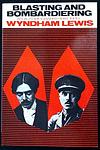Wyndham Lewis
Percy Wyndham Lewis (1882–1957) was a British writer, painter, and critic, who is often associated with modernism and the Vorticist movement, which he co-founded. He authored numerous novels, such as 'Tarr' and 'The Apes of God', as well as works of criticism and satire. Lewis was known for his sharp wit and controversial opinions, which often challenged the political and cultural norms of his time.
Books
This list of books are ONLY the books that have been ranked on the lists that are aggregated on this site. This is not a comprehensive list of all books by this author.
-
1. Tarr
"Tarr" is a novel set in pre-World War I Paris and follows the story of an English artist, Frederick Tarr. The narrative explores the complex relationships between Tarr and his friends, including his German rival Kreisler and the woman they both love, Bertha. The novel delves into themes of modernism, masculinity, and the clash of cultures, while also providing a satirical critique of the bohemian lifestyle in early 20th century Paris.
-
2. The Apes of God
"The Apes of God" is a satirical novel that critiques the literary and artistic scene of 1920s London. The narrative follows a naive young man from the English countryside who becomes entangled in the pretentious and superficial world of London's modernist elite. The book is known for its biting wit, complex character portrayals, and intricate plot, providing a scathing critique of the cultural and intellectual pretensions of the time.
-
3. Blasting And Bombardiering
This book is an autobiographical account that blends sardonic wit with vivid descriptions of the author's experiences during the first half of the 20th century, particularly focusing on his time serving as an artillery officer during World War I. It offers a trenchant critique of modern warfare and the cultural shifts of the era, as well as an inside look at the author's involvement with the avant-garde art and literary movements of the time. The narrative is characterized by its acerbic humor, intellectual rigor, and the author's distinctive perspective on the chaos and transformation that defined the early decades of the twentieth century.


